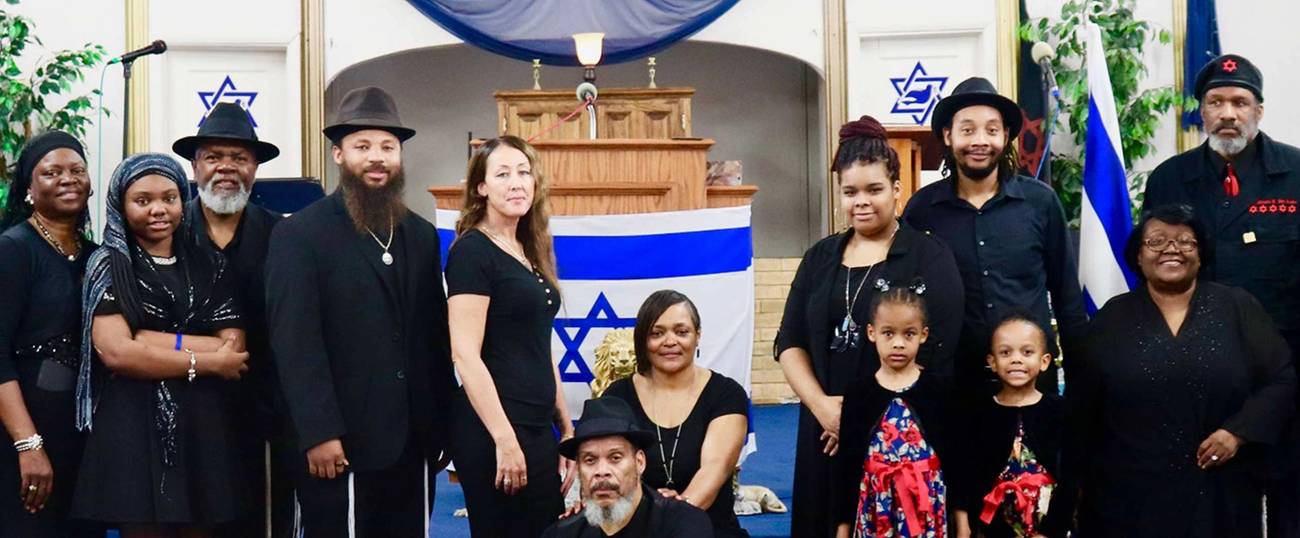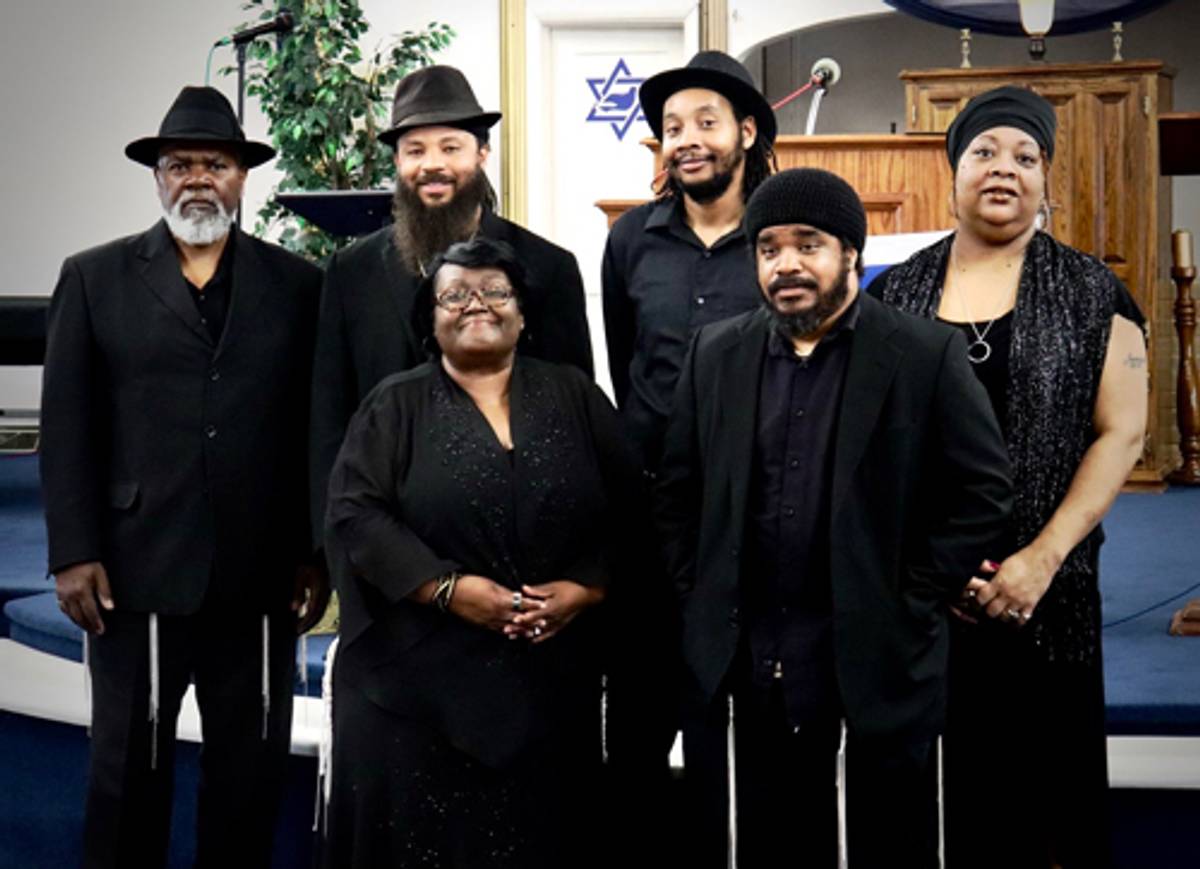A Black Convert Saves Judaism in Small-Town Indiana
Rabbi Moshe has created an Indiana synagogue with 100 of his converts. Will other Jews accept them?




In 2011, Andre Allen Hairston was arrested for dealing cocaine and sentenced to six years (he was released after five) at Indiana’s Miami Correctional Facility. He considered himself a believing Christian, even if he had not always behaved in a Christ-like manner. Midway through his sentence, Hairston joined a regular meeting of men who would study with a rabbi every week. They learned the weekly Torah portion, and they discussed Jewish spirituality. But the rabbis didn’t come simply to offer guidance to the inmates. They wanted to convert them to Judaism.
The rabbis who taught at Miami “didn’t look at me as though I was an inmate or a prisoner,” said Hairston, who—like the rabbis—is black. “They never questioned why I was incarcerated.” With the grace and guidance of his new teachers, Hairston began to notice changes in himself. “In my pursuit of the Jewish lifestyle, it actually produced this favorable type of situation amongst other prisoners, amongst the administration, the correctional officers,” he said. Like Joseph in the book of Genesis, Hairston said, he, too, had to be incarcerated before finding his calling.
At first, not yet ready to leave Jesus behind, Hairston first called himself a messianic Jew. But the rabbis who came to teach “behind the wall,” as Hairston refers to prison, would “show the difference between Christianity and Judaism.” Over the course of two years studying with members of Congregation Yeshivat Tzion’s prison ministry, “I discovered that I had a Jewish soul,” Hairston told me. “I have to go with a higher thought, which is going to be found in Judaism itself.”
By the time he left prison, he went by the name Yehoshua Ben Moshe, and he considered himself a Jew. After leaving prison, Hairston moved to Kokomo, a city of nearly 60,000 in central Indiana where over 100 people—“black and white Jews, Jews of different hues,” as Hairston puts it—have converted to Judaism at Yeshivat Tzion. Hairston soon joined the synagogue’s rabbinical seminary. “It was almost like putting a puzzle piece that needed to fit the puzzle, putting that piece right in its proper place,” Hairston said. He is just a few assignments away from being ordained, and he is an active member of the prison ministry, now on the other side of the wall.
At the heart of the renaissance of Jewish life in Kokomo is Roosevelt Solomon Jr., a minister’s son who entered the ministry himself as a young man. Rabbi Moshe, as he now calls himself, created Congregation Yeshivat Tzion sometime around 2014 (he doesn’t remember exactly when) with the unorthodox goal of converting others to Judaism in the spirit of “Jewish unity.” He describes his synagogue’s tradition as Sephardic and neo-Hasidic, with many members observing kashrut and keeping Shabbat.
The Judaism that Rabbi Moshe has embraced—some would say created—is in many ways different from the Judaism most Jews know. To many, it’s probably unacceptable. But soon, it will be the only Judaism left in this small Midwestern town. And in surviving, and seeking converts—a very Christian thing to do—even as a local Reform temple gets ready to shut its doors, it poses difficult questions about Jewish continuity, and what we might be prepared to accept in order to have a future.
Born in Kokomo in 1952, Rabbi Moshe grew up to become a Baptist minister in his hometown. While in that pulpit, he took a trip to Israel, and while there had an “epiphany,” he told me. “I began to discover a lot of the principles that I had within me … lined up more with Judaism than they did with Christianity,” he said. He converted to Judaism under the auspices of Manhattan’s unaffiliated New Synagogue, and brought with him a central tenet of Christianity: converting others. “We advocate for the diversity that has characterized the Jewish people throughout history, and through contemporary forces including conversion and adoption,” reads Yeshivat Tzion’s website.
The New Synagogue is a congregation in New York founded by Rabbi Joseph Gelberman, a Hungarian immigrant who had also founded the Rabbinical Seminary International, a seminary not accepted by any of the traditional movements. (Unlike traditional rabbinical schools, which require four or five years of intensive study, most of its requirements can be completed online.) “I have an idea they disapprove of me,” Gelberman said of Orthodox, Conservative, and Reform rabbis in a 1998 interview with the New York Daily News. (Gelberman died in 2010 at age 98.) Rabbi Moshe was told by his own rabbi, William Kurry, who died last year and had been ordained by Gelberman’s school, that “most of them will never accept you all the way.” He said Kurry warned him that Jews would look down on Yeshivat Tzion for its conversion practices. “We teach the people not to allow what other people think of them to define them,” Rabbi Moshe said.
But when Rabbi Moshe set out to bring mostly African American Christians into the Jewish fold, he knew that he had to innovate. The normative Judaism that he and his fellows Jews-by-choice encountered simply would not mesh with their worldview and experiences. “They were running into Judaism that’s expressed from Europe,” Rabbi Moshe told me of the people he has converted.
So they do things differently at Yeshivat Tzion. “It’s not a change in what we’re going to use, a siddur or something of that nature, but a change in the way we express it.” Black-inflected music and spirituality are central to their practice; a recording posted to the synagogue’s Facebook page features a congregant reading the story of the exodus from Egypt in the style of slam poetry, with a muted electronic beat playing in the background. Yeshivat Tzion’s style of tefillah might appear unfamiliar to Jews from mainstream denominations, with more in common with, say, Renewal Judaism: English translations are used more often than at most congregations, and original musical compositions by the members play a key role in Yeshivat Tzion events. But at the heart of the synagogue’s observance is the Amidah prayer and the weekly Torah portion—familiar territory for any Jew who’s stepped foot in a synagogue. Belonging to Yeshivat Tzion also means being a proud Zionist, and seeking to one day make aliyah to Israel.
Yeshivat Tzion has over 100 members, all of whom converted to Judaism under Rabbi Moshe’s spiritual authority. Religious events happen every day except Wednesday, when the rabbis minister in prisons across Indiana. The schedule at Yeshivat Tzion is packed: Kabbalat Shabbat on Friday night, services on Saturday, yeshiva classes for Rabbi Moshe’s 15 rabbinical students all day Sunday, Monday, and Thursday, conversion classes Sunday nights, and a weekly d’var Torah on Tuesday evenings.
I brought the topic of Yeshivat Tzion’s conversion practices to Rabbi Joel Roth, a professor at the Jewish Theological Seminary and head of the Conservative Yeshiva in Jerusalem. Roth explained that converts are full Jews, and that there’s no reason a congregation couldn’t comprise only converts. However, he cautioned, a rabbi creating his own customs, who moreover is not aligned with one of the major Jewish seminaries in the United States, might not be strictly following Jewish law. And if he doesn’t do what is legally required for conversion—circumcision for males, immersion in a ritual bath for both men and women—those conversions will not count. “No Jew who considers Jewish law binding and authoritative would be willing to consider them Jewish unless the requirements of Jewish law were complied with,” Roth said.

Yeshivat Tzion does follow these rules strictly, Rabbi Moshe told me. Circumcision is a requirement for men, he explained, and everyone must go to the mikvah, or ritual bath, to complete their conversion. Everyone must learn some Hebrew, he said, as well as the components of the Jewish prayer service, the laws of kashrut, and more.
Rabbi Moshe opened Yeshivat Tzion after converting at the New Synagogue and getting smicha, ordination, from Gelberman’s Rabbinical Seminary International. His synagogue affiliates with no denomination, but does have ties with Herut, a small Zionist organization based in Israel that, like Yeshivat Tzion, promotes Jewish unity and seeks to reach “Jews that have been left out,” according to its founder, Karma Feinstein-Cohen. Rabbi Moshe told me that one of Yeshivat Tzion’s goals is to be recognized in Israel “as an institution.” Aliyah is something he and his congregants are actively working toward. “We want to go home. We feel like Israel is our home,” Rabbi Moshe said.
Presumably Yeshivat Tzion could test out this mission at home in Kokomo, with Reform Temple B’nai Israel, a tiny congregation just a few blocks away. “Periodically we’ve met with the Reform synagogue here,” Rabbi Moshe said, but “we don’t connect that often.” They don’t always respond to Yeshivat Tzion’s invitations. But that likely has less to do with disagreements over Jewish practice than to the simple reality that B’nai Israel hardly exists anymore, its membership dwindling to near nothing. The two synagogues celebrated Simchat Torah together once, which “was a really, really amazing thing,” said Jason Cook, who served as B’nai Israel’s student rabbi in the 2017-2018 year. But the following year the synagogue could only afford to have a student rabbi to visit four times, instead of once a month.
I asked Lee Shai Weissbach, author of Jewish Life in Small-Town America, what is lost when small-town synagogues like B’nai Israel disappear. His answer surprised me: “As a traditionalist,” he explained, he thinks a “bigger loss” would actually be “if big-city Jews moved out to small towns.” In big- and even medium-size cities, he said, diversity of Jewish practice can thrive, because people can choose between different synagogues or minyanim.
Yeshivat Tzion presents something that’s hard to classify because it does not fit either mold described by Weissbach. Its members practice Judaism in new and creative ways that would feel innovative even in New York or Los Angeles—yet they do this in Kokomo, far from any center of Jewish life. And soon, in Kokomo, the only Judaism may be this newly created, syncretized Judaism. Reform Temple B’nai Israel has started working with the Jewish Community Legacy Project, a nonprofit that helps “small Jewish communities honor their pasts while planning for their futures,” on a plan for when it officially shutters, helping rescue and give away its Torah scrolls and prayer books, and planning the upkeep of the local Jewish cemetery once the Jews are gone. The temple, founded in 1942 by Ashkenazi Jews, is not dead yet, but it has moved into hospice care.
Meanwhile, a video of Yeshivat Tzion’s Rosh Hashanah service reveals many components that do not appear in any machzor. One man played electric guitar and sang about Levites and Kohanim. Another did a freestyle rap. “Say I can’t be Jewish ’cause I’m black,” he sang, a tallit wrapped around his shoulders. Then three women came to the front and harmonized together—first, a soulful a cappella rendition of the priestly blessing, and then a lively “Adon Olam,” accompanied by tambourine and the congregants tapping their feet to the beat. At the end, everyone said, “Shana tova.”
Gabby Deutch is the Washington correspondent at NewsGuard. Her writing has appeared in The Atlantic and Politico Magazine. Follow her on Twitter @GSDeutch